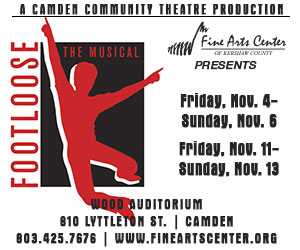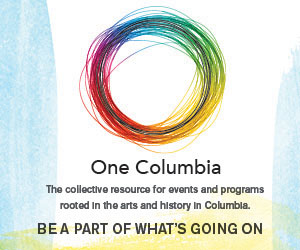A Review of Standing on Ceremony: The Gay Marriage Plays
 Words for Things:
Words for Things:
A Review of Standing on Ceremony: The Gay Marriage Plays
In the opening scene of Standing on Ceremony: The Gay Marriage Plays, currently on stage in the Trustus Side Door Theatre (through January 11), two men in a swanky hotel dither over their wedding vows. One man, Wallace, is drafting vows based on the usual “to have and to hold” verbiage handed down to us from the 1549 Book of Common Prayer. The other, Nate, objects that it sounds a little too traditional. “I don’t mean ‘traditional’ like buttoned-down,” he says. “I mean traditional, like, a man and a woman.”
“I mean why do we have to have the same language, right? Different words for different things, right?”
Marriage. Tradition. Partner. Husband. Different words for different things. Later in Mo Gaffney’s “A Traditional Wedding,” a lesbian couple decide they don’t like “bride” or “groom,” and opt instead for “broom,” placing two little brooms on top of their cake. In the last act, in José Rivera’s transcendent “Pablo & Andrew at the Altar of Words,” two grooms offer their own vows to one another, a series of increasingly poetic, occasionally bawdy, and deeply human vows they wrote, as one says, “Because we wanted to capture something that cannot be caught.”
The performance opens with two men revising the traditional vows to make them more accurate, and it ends with two men pledging their “honest love” to one another in vows they wrote themselves at “the altar of words.” While the nine one-act plays collected here offer a range of human stories and voices on a hot button issue—gay marriage, marriage equality, or as my friend Brad calls it, um, marriage—language is clearly a central theme threading these plays.
That, and the rapidly changing legal and social mores of this moment.
Director Elena Martínez-Vidal has assembled a strong ensemble cast—Terrance Henderson, Mark Ingham, Zsuzsa Manna, Ellen Rodillo-Fowler, Jennifer Moody Sanchez, and Chip Stubbs. Manna stood out in the matinee performance I saw, a whipcrack of one-liners and comic timing. I should note, however, that she also gets some of the best female parts, like the role of Mary Abigail Carstairs-Sweetbuckle, a spokesperson for Focus on the Family, Family First, Save the Family, and the Traditional Family Delta Force (among others), in Paul Rudnick’s zany “The Gay Agenda,” or the smartass lesbian in Doug Wright’s “On Facebook,” to my mind one of the best of the short plays, despite its lack of physical action. I also found Stubbs and Henderson quite moving, especially in the three plays in which they played a couple—especially Stubbs’ indignant anger in “On Facebook,” the vows in “Pablo & Andrew,” and the sweetness and pathos of Neil LaBute’s “Strange Fruit,” in which together they tell the story of a hate crime, their deeply felt separation underlined by their heartbreaking holding of hands as the lights went down. Sanchez was quite funny as well, especially as Cate, who “didn’t want any of that traditional crap” in “A Traditional Wedding” and rejects a wedding planner as “so ‘Kardashians,’” though I wish that Rodillo-Fowler had brought to the lesbian relationships the kind of emotional depth and stage chemistry so evident elsewhere in the cast.
Martínez-Vidal also makes the best of the small black box theatre and minimal props. Black boxes of various shapes can be an airport lounge, a hotel bed, or, draped with a cloth, a coffin. I love plays that emphasize theatricality, so I found the interval changing of sets remarkably effective, sometimes played for humor, sometimes almost ritualistic in movement and music. And around the walls of the black box theatre were photos of recently married lesbian and gay couples.
The play feels weirdly timely, of course, given the ever-shifting winds of courtroom decisions and public opinion here—federal court decisions and rogue probate judges and appeals and stays and Attorney General Alan Wilson and Governor Nikki Haley doing their damndest to yank hope (and a lot of legal rights) away from South Carolina’s gay and lesbian couples. (There should have been editorial cartoon with the two of them standing on either side of a door—wedding chapel or courthouse office—with signs saying “No Gays Allowed.”) And Columbia Councilman Cameron Runyan, who got into office by soliciting funds and votes from gays and lesbians, waxing incoherent in The State and elsewhere.
The views of Runyan and his ilk are present in the plays, too. We are told of family members who refuse to attend their children’s weddings, family members who kick out their lesbian daughters, and we meet a deeply repugnant “friend” in “On Facebook” who posts one condemnatory comment after another—assured that all will go well if she punctuates each post with a smiley face. (We all know this person, right?) But those voices of derision and rejection and familial shunning can’t drag this performance down. Mary Carstairs-Sweetbuckle is hilariously haunted by the counterpoint gay voice in her head. (How does she know it’s gay? “Well, it was very simple, because that voice was bitchy and it was relentless and it was right.”) And honestly, by the time we’ve been through all these stories of commitment and kinship and loss, we realize it’s the love that matters, not these petty voices still holding up the “no gays allowed” signs at the doors.
*
In Jordan Harrison’s “The Revision,” Wallace and Nate work through the language of the traditional vows, phrase by phrase. “Lawfully-wedded husband” becomes “lawfully civil-unioned.” Phrases about richer or poorer, sickness and health are transformed into fiscal portfolios and health-care providers. As Nate insists, without the right to emergency medical decisions and “no paid leave to care for a sick partner,” they can’t really say “in sickness and in health.” “I mean, we don’t want to look like liars, do we. Just tweak the language a bit.” Thus, from the outset,the play makes us conscious of the shifting and restrictive legalities that vary, for now, state to state.
Three phrases, tellingly, remain the same: “to have and to hold from this day forward,” “in the eyes of God,” and “to cherish him the rest of your days.” These phrases of love, companionship, and witness resonate as true, even as the men find different words for different things, even though they feel the need to add a qualifying phrase to “the eyes of God”: “in the eyes of God and the ever-shifting whims of state and federal constitutional law.”
I love that the play opens with this attention to changes in language and form. I’m reminded that the Episcopal Church deleted the stipulation that brides obey their husbands in 1922, and Princess Diana scandalized the Brits when she dropped the vow to obey when she married Prince Charles in 1981. Brides now usually “love, honor, and cherish” rather than “love, honor, and obey.” (Of course, the Southern Baptists, desperate to maintain patriarchy as integral to “traditional” marriage, declared in 1998 that a woman should “submit herself graciously” to her husband. Nota bene: they no longer affirm Saint Paul’s insistence that slaves should be obedient to their masters.)
Despite the ahistorical claims of many opponents of gay marriage, marriage has been a constantly evolving thing, especially in the last two centuries, as it became an affair of the heart, not family and economics, and as individuals decided who they should wed and when, not their parents. The 19th century firmly installed love—not economics, not kinship, not reproduction—at the heart of marriage, the early 20th century marriage manuals made sexual fulfillment central, and both centuries slowly realized that women were not only not the property of their husbands, but that they also had the right to their own property and custody rights and autonomy. (In previous centuries, custody went to the father. That was, they thought, only natural.) More recently, our courts decided that birth control was a decision best left to couples, not to the government, and that women’s autonomy extended to their own bodies (and marital rape was a crime, not a prerogative of marriage). The “traditional” family is a fantasy of the middle 20th century, not a fact. Extending the promises, rights, and responsibilities of marriage to gays and lesbians is just another (logical) step in the evolving definition of marriage.
I love that the play closes with vows written rather than rote. Throughout there’s a sense of the DIY project of lesbian and gay marriages. When you’re told you can’t have a ceremony, you create your own ceremonies, you make it your own—so yes, brooms on the cake and your own vows. When Pablo and Andrew, played by Henderson and Stubbs, state their vows, a conversation of poetic give and take that rises in intensity and beauty, I was lifted. “With this ring, precioso, I thee wed,” says Pablo. “I thee take. I thee embrace. I thee celebrate. I thee wash from head to toe. I thee articulate. I thee hold, through doubts and fevers and loss and the sweet, melancholy and eventual crumbling of our well-worn bodies.” Lovely, and acted out with such sweet precision and intensity by Henderson.
I also love that the play opens by drawing attention to the issue of location, the “whims” of state and federal law—that where you are geographically, culturally, socially matters in very real ways. William Walker published an incisive essay in the Huffington Post about this problem last fall, when he had a husband in California but not when he returned home to South Carolina. In South Carolina, neither his marriage nor his family was safe, he said. In an emergency, he asked, would his spouse be recognized as his spouse? Would they both be seen as their children’s parents? “It’s not a hypothetical fear.”
Given this attention to both language and location, the most interesting play is Doug Wright’s “On Facebook.” Bob, played by Ingham, tells us as the lights come up that the play is not a fiction; it is “a dramatization of a thread which actually appeared on Facebook,” apparently after the 2009 vote to repeal marriage equality in Maine. Facebook is a virtual space in which conversations about issues among disparate and distant friends can go so very very wrong. The play recreates that space effectively; there’s a woman who doesn’t know the difference between a private message and a post, folks who don’t get irony, and of course the language of “likes,” emoticons, posts deleted because they are harassing messages, and someone getting mad and saying, “Everybody has a right to their own beliefs!” and then defriending everyone else. And the most hateful participant in the conversation assures us—with that tired old standard of disavowed prejudice (pace Sarah Palin)—that she has gay friends. She is also divorced, and the lone lesbian in the conversation reminds her that she broke her sacred vows. Divorce—or perhaps more broadly the expectation that companionship and happiness are central to the definition of marriage—is another way that the customs and culture of marriage have changed.
Part of the impact of Standing on Ceremony is that it gives us human stories without lapsing into propaganda, despite the implicit awareness of law and language. And it’s a real range of stories—from giddy farce to a moving funeral eulogy. Rudnick’s two plays (he is the only playwright with two plays in this work), “The Gay Agenda” and “My Husband,” are quite funny, silly, in fact. The first might have more bite here in South Carolina, with its delusional-though-self-assured Christian lady who hates gay marriage but still likes the gay couple next door. The second feels too much an in joke, with its single gay man in New York and his Jewish mother, an NYU professor who is determined to out-gay her queer theory colleague through her fantasies about her gay son.
My only real complaint, though, is about the script, not the performance. Standing on Ceremony feels awfully New-York-centric. The South is just a punch line (“all magnolia blossoms and Ashley Wilkes”). And even though the two LA lesbians in Wendy MacLeod’s “The Flight Tonight” are headed to Iowa to be married in the historic Lutheran church in one’s hometown (the other wanted a gay choir, a clambake, and lilies shaped like vulvas), the heartland is a joke, too. “Making fun of Iowa is just shooting fish in a barrel.” “Do they really shoot fish in barrels there?” Sigh.
Two other acts offer more serious fare: LaBute’s “Strange Fruit” and “London Mosquitoes” by Moisés Kaufman. I really wanted to like “London Mosquitoes”—I am a fan of Kaufman’s other work, especially The Laramie Project and Gross Indecency: The Three Trials of Oscar Wilde (Trustus staged a powerful production of this several years ago). This short play has the greatest historical reach, taking in Kennedy’s assassination, Nixon, and 9-11, as well as the even greater span of evolution. But unwilling to let a metaphor be a metaphor and to trust his audience to get the point, Kaufman decides to explain the metaphor, so that by the time we reached the end of what should have been a tearful funeral farewell, I felt more annoyed than moved.
*
In “The Flight Tonight,” the two women headed to Iowa to get married briefly consider the question of whether they should wait “till it’s legal here,” a question that surely resonates for many who contemplated legal marriage elsewhere before South Carolina joined the ranks of states with marriage equality.
Introducing the matinee I saw, director Martínez-Vidal said that when she first took on the play, “I thought I would be up here talking about the issues, but now it’s just like, yea!” Still, she said, in South Carolina, “You can get married on Sunday and fired on Monday.” (A friend asked, as I was working on this review, “I wonder if going up against the right-to-work state is going to be more difficult than going up against the ‘Christian’ extremist state.”)
A timely play. An interesting time. There is still work to do.






.jpg)
